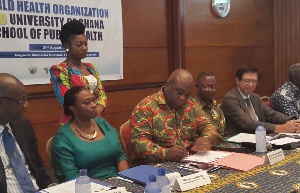 Prof Richard Adanu, Dr Magda Robalo, Dr Victor Asare-Bampoe, and other dignitaries at the Training
Prof Richard Adanu, Dr Magda Robalo, Dr Victor Asare-Bampoe, and other dignitaries at the Training
The World Health Organisation (WHO) and its partners have signed an agreement with the School of Public Health, University of Ghana, for the release of $792,000 to train district and sub-district health staff on disease control and surveillance.
The signing of the agreement will see approximately 175 frontline health workers from five regions in the country benefitting from the basic field epidemiology training under the School of Public Health, Ghana Field Epidemiology and Laboratory Training Programme (GFELTP).
The participants of the training will go through a three-week classroom work in the selected regions, followed by a three-month field work in analysis of routine surveillance data, surveillance system evaluation, outbreak investigations and response and mapping out epidemic prone diseases by place and time in their respective catchment areas.
They will also prepare reports of their outputs and come back to share their outputs and experiences with stakeholders and colleague health workers.
Prof Richard Adanu, Dean of the School of Public Health, in a brief statement during the signing ceremony, disclosed that the agreement demonstrates how United Nations (UN) agencies and partners can support institutions to strengthen the capacity of health personnel to address public health needs in Ghana.
He said the capacity to manage the occurrence of major communicable diseases and the emerging incidence of non-communicable diseases in the country “is weak although there is some competent field and trained professionals who can effectively manage public health emergencies at the national level.”
“A case in point was the Ebola virus disease which has and is still causing high morbidity in the sub-region. The EVD scare in Ghana exposed the lack of capacity of the health sector at levels which serve as the first port of call for most health threats,” he added.
He, therefore, mentioned that the training would help strengthen disease surveillance system in the country.
Dr Magda Robalo, WHO, country representative, said it was time for institutions to move forward and strengthen their collaborative efforts so they can strengthen their capacities.
She said the programme would improve public health intervention management skills at all levels of the country’s health system.
Dr Robalo also acknowledged the WHO partners who support the agency in its work.
Dignitaries at the signing ceremony were Prof Yao Tettey, Provost College of Health Sciences, Kaoru Yoshimura, Ambassador Extraordinary and plenipotentiary of Japan to Ghana and Dr Victor Asare-Bampoe, Deputy Minister of Health.
GFELTP
The persisting need for well-trained epidemiologist to support the public health surveillance, outbreak investigations and response system informed the development of the Ghana Field Epidemiology and Laboratory Training Programme (GFELTP).
The GFELTP is a two-year postgraduate programme of service and on the job learn-in applied epidemiology and public health laboratory practice for physicians veterinarians, laboratory scientist in the context of the team approach to disease control.
The programme leads to the awards of a certificate of competence and a master of Philosophy degree in Applied Epidemiology and disease control at the School of Public Health, University of Ghana.
The programme has so far trained 52 graduates who are providing services to enhance disease surveillance and response activities.